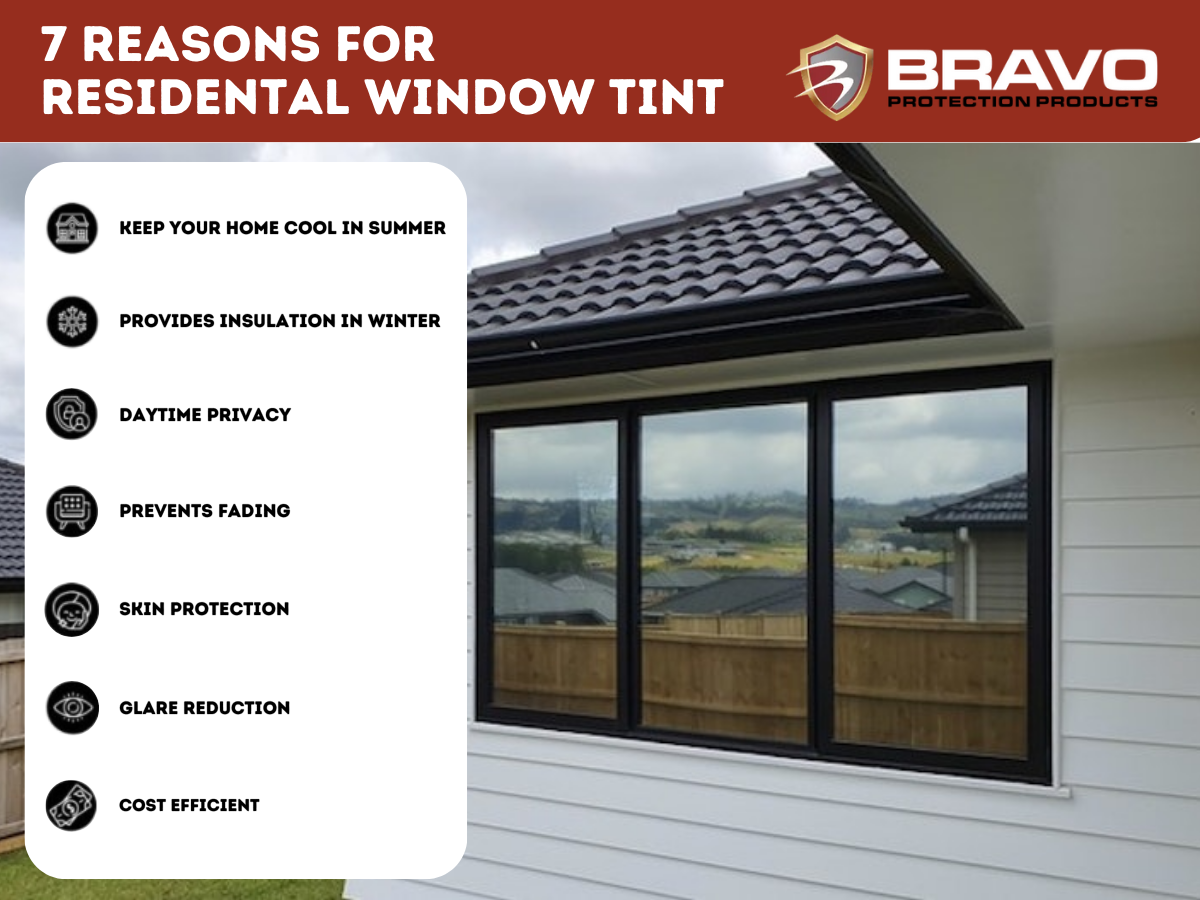Residential Window Tint: Increase Safety And Security and Include a Layer of Security
How Residential Home Window Tinting Boosts Your Home's Energy Effectiveness
Residential window tinting offers a compelling option for house owners looking for to enhance energy effectiveness within their living spaces. By using specialized films to windows, it successfully minimizes warm transfer, consequently supporting indoor temperature levels and minimizing the need for excessive heating or cooling.
Comprehending Window Tinting
Understanding home window tinting is necessary for property owners looking for to boost both convenience and energy effectiveness in their space. Residential Window Tint. Window tinting entails the application of a thin movie to the interior or exterior surface of glass windows. This film can substantially regulate the quantity of sunlight and warmth that gets in a home, thus influencing indoor climate problems
There are various kinds of window tinting movies offered, each with unique properties. The efficiency of home window tinting is commonly determined by its Visible Light Transmission (VLT) percent, which indicates exactly how much light can pass through the movie.
Advantages of Power Performance
Window tinting not only boosts aesthetic appeals yet additionally plays a significant role in boosting energy effectiveness within household spaces. By reducing heat transfer through home windows, colored films develop a more secure indoor environment, which can cause significant decreases in energy intake for heating & cooling. This energy performance equates right into lower energy bills, supplying property owners with considerable long-lasting financial savings.

In addition, window tinting improves the convenience of living rooms. By decreasing glow and blocking hazardous UV rays, tinted home windows create a more enjoyable setting, which can lead to improved well-being for occupants. The defense versus UV rays additionally assists preserve furniture and flooring from fading, contributing to the durability of house items.
Just How Tinting Works
Tinting films operate with a mix of advanced products and innovations developed to control the amount of solar power entering a home. Primarily made up of polyester, these movies frequently incorporate ceramic or metal particles that absorb and reflect heat. This double capacity enables them to substantially lower the penetration of ultraviolet (UV) rays and infrared radiation while allowing noticeable light to go through.
The performance of window tinting is determined by its solar heat gain coefficient (SHGC), which indicates just how much solar power is transferred with the window. Reduced SHGC worths are more effective as they represent higher warm rejection. Furthermore, window colors can include a range of tones, enabling home owners to customize their aesthetic choices while boosting energy effectiveness.
Additionally, these films act as an obstacle, protecting against heat loss throughout chillier months by mirroring indoor warmth back visit right into the space. This thermal insulation effect matches the cooling benefits gained during warmer months, adding to a well balanced interior climate year-round. By taking care of solar power effectively, residential window tinting not just improves convenience but likewise plays an important duty in minimizing energy consumption and lowering energy costs.
Choosing the Right Color

There are numerous kinds of home window movies available, including colored, metalized, and ceramic. Dyed films are cost-efficient yet might have restricted toughness. Metalized movies offer far better warm denial however can hinder electronic signals. Ceramic films give excellent heat control without jeopardizing visibility and are highly resilient, making them a popular choice.
Visible light transmission (VLT) is another vital variable, as it suggests the amount of all-natural light that can go through the colored glass. House owners ought to pick a color with a VLT that complements their illumination preferences while still providing appropriate glow decrease.
Additionally, examining the solar heat gain coefficient (SHGC) can help determine how well a tint can block warm from sunshine. A lower SHGC indicates much better warm control, ultimately boosting power performance.
Installation and Maintenance Tips
Appropriate setup and upkeep are essential parts in making best use of the advantages of property window tinting. Professionals additionally use specialized strategies and tools, which can improve the sturdiness and efficiency of the color.
Complying with installation, maintenance is necessary to extend the life of the window movie. It is suggested to wait at the very least 30 days prior to cleansing the tinted home windows to allow the adhesive to cure completely. When cleansing, use a soft cloth and a mild, ammonia-free cleaner to avoid damaging the film. Stay clear of abrasive products that can scratch the surface.
Additionally, regular inspections are helpful. Look for any type of peeling or bubbling, which might suggest incorrect installation or use over time - Residential Window Tint. Addressing these concerns promptly can prevent additional damage and preserve energy performance. By adhering to these installment and maintenance ideas, property owners can ensure their home window tinting continues to give considerable power cost savings and comfort for years to come.
Conclusion
In final More hints thought, residential home go now window tinting serves as an effective option for improving power efficiency within homes. By decreasing warmth transfer and obstructing unsafe UV rays, home window movies add to decrease power consumption and improved indoor comfort.
Window tinting entails the application of a thin movie to the interior or outside surface of glass windows. By decreasing heat transfer with windows, colored films create a more steady interior climate, which can lead to significant reductions in energy usage for heating and air conditioning.The efficiency of window tinting is measured by its solar warmth gain coefficient (SHGC), which indicates just how much solar energy is transmitted through the window. By handling solar power successfully, residential home window tinting not only enhances comfort but likewise plays an essential function in reducing power intake and lowering utility expenses.
By lowering warm transfer and blocking harmful UV rays, window films contribute to reduce power usage and boosted indoor comfort.